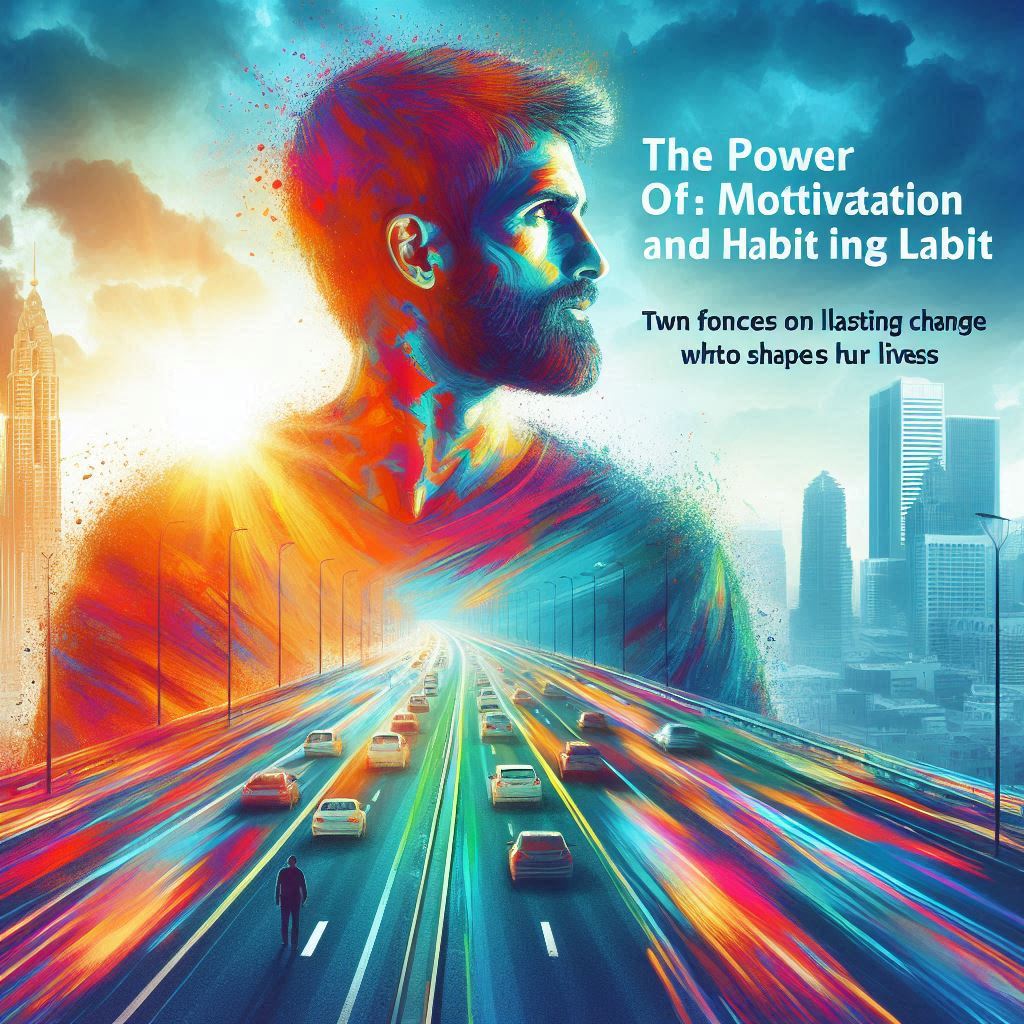Contents
- 1 Understanding the Twin Forces That Shape Our Lives
- 2 Prof. Aécio D’Silva, Ph.D. AquaUniversity
- 3 Discover the dynamic duo of personal development: motivation, the spark that ignites action, and habit, the engine that propels you forward.
- 4 Motivation and Habit – The Role of Motivation
- 5 The Science Behind Motivation
- 6 Motivation and Habit – Cultivating Motivation
- 7 The Limitations of Motivation
- 8 Motivation and Habit – The Power of Habit
- 9
- 10 Building Lasting Habits
- 11 Motivation and Habit – Examples of positive habits that can have a significant impact on various aspects of Your life:
- 12 Motivation and Habit – How can I start a gratitude journal?
- 13
- 14 How can I stay motivated to continue these habits long-term?
Understanding the Twin Forces That Shape Our Lives
Prof. Aécio D’Silva, Ph.D.
AquaUniversity
Discover the dynamic duo of personal development: motivation, the spark that ignites action, and habit, the engine that propels you forward.
In the journey of self-improvement, two forces play pivotal roles: motivation and habit. While motivation is often celebrated as the catalyst for action, it is a habit that sustains progress and leads to enduring transformation. This collaborative intelligence post explores how these two elements work together to create a powerful synergy for your personal growth.
Motivation and Habit – The Role of Motivation
Motivation is the initial thrust that launches us toward our goals. The emotional and psychological push drives us to take the first step. Whether it’s inspiration from a role model, the desire for self-improvement, or the pursuit of a passion, motivation is the spark that lights the fire of action.
The Science Behind Motivation
Motivation is deeply rooted in the brain’s reward system. Neurotransmitters like dopamine signal pleasure and reward, reinforcing the behaviors that lead us to achieve our objectives. Understanding this can help us harness motivation more effectively.
Motivation and Habit – Cultivating Motivation
To keep motivation alive, it’s essential to set clear, achievable goals, seek inspiration, and maintain a positive mindset. Surrounding oneself with supportive individuals and engaging in regular self-reflection can also nurture motivation.
The Limitations of Motivation
While motivation is a powerful starter, it can be fleeting. Reliance on motivation alone can lead to inconsistency, as it often wanes in the face of challenges or once the novelty of a new endeavor fades.
Motivation and Habit – The Power of Habit
Habit is the steady force that keeps us moving forward. It transforms our aspirations into automatic actions, making them part of our daily routine. Over time, habits can lead to profound changes in our behavior and mindset.
Building Lasting Habits
Creating a habit requires consistency and repetition. By starting small and gradually increasing the complexity of our routines, we can build habits that stick. It’s also helpful to anchor new habits to existing ones to create a robust structure.
The Role of Discipline – Discipline is the bridge between motivation and habit. It’s what compels us to act even when motivation is low. By exercising discipline, we can maintain momentum and ensure that our habits continue to serve us.
Habit Stacking – Habit stacking involves adding new habits onto ones that are already well-established. This technique leverages the power of existing patterns to introduce new behaviors seamlessly into our lives.
The Impact of Environment – Our environment plays a crucial role in habit formation. By designing our surroundings to support our goals, we can make it easier to foster positive habits and eliminate distractions that might lead us astray.
Motivation and Habit – Examples of positive habits that can have a significant impact on various aspects of Your life:
Daily Exercise – Incorporating a routine of daily exercise, even if it’s just a brisk 20-minute walk-sunbathe, can improve physical health, boost mental well-being, and increase overall productivity.
Daily Hydration – Drinking 500 ml of water three times a day is the best medication for your body. Most importantly, drink the first 500 ml right after waking up, before brushing your teeth or eating anything.
Meditative Breathing – Cultivating a habit of meditation and mindful breathing can significantly enhance both your day and night. Practices like Psalm 23-247-Meditative breathing promote peace and balance in your daily activities. Make it a point to engage in this whenever your mind is idle!
Mindful Eating – Developing the habit of mindful eating, which involves savoring each bite and being fully present during meals, can enhance digestion, promote better food choices, and lead to a healthier relationship with food.
Regular Reading – Setting aside time each day for reading can expand knowledge, improve focus and concentration, and provide a source of relaxation and escapism. Reading or listening to a Bible Psalm every day before starting work is a refreshing and uplifting habit for the mind!
Gratitude Journaling – Keeping a gratitude journal and writing down a few things you’re thankful for each day can cultivate a positive mindset and increase overall happiness.
Efficient Time Management – Practicing efficient time management techniques, such as the Pomodoro Technique or time-blocking, can help in achieving more in less time and reducing stress.
Quality Sleep Routine – Establishing a consistent sleep routine, ensuring 7-9 hours of quality sleep, can enhance cognitive function, mood, and energy levels throughout the day.
Financial Tracking – Maintaining a habit of tracking expenses and budgeting can lead to better financial health and enable long-term savings and investment goals.
These habits, when practiced consistently, can lead to significant improvements in one’s lifestyle and overall satisfaction. Remember, the key to developing a new habit is to start small and stay consistent. Over time, these small changes can lead to big results. Keep going!
Motivation and Habit – How can I start a gratitude journal?
Starting a gratitude journal is a wonderful way to cultivate a positive-creative outlook and appreciate God’s good in your life. Here’s a simple guide to get you started:
1 Choose Your Medium: Decide whether you prefer a physical notebook or a digital app for your journaling. Both have their benefits; a notebook is tangible and personal, while an app can be convenient and easily accessible.
- Set a Routine: Determine a specific time each day for your journaling. It could be first thing in the morning, during your lunch break, or right before bed. Consistency is key.
- Keep It Simple: Start by writing down three things you are grateful for each day. These can be as simple as a sunny day, a good cup of coffee, or a kind gesture from a stranger.
- Go Beyond the Surface: As you get more comfortable, try to delve deeper. Reflect on why you’re grateful for these things and how they impact your life.
- Make It a Habit: Commit to writing in your gratitude journal daily for at least a month. This will help establish it as a habit and integrate it into your daily routine.
- Reflect Regularly: Take time each week or month to read back through your entries. This reflection can provide insight into what brings you joy and where you find meaning in your life.
- Be Creative: Feel free to add quotes, doodles, or stickers to your journal. It’s your personal space to express gratitude in whatever way feels right to you.
Remember, the goal of a gratitude journal is not to write a novel each day but to simply pause and recognize the positive aspects of your life. It’s a personal journey, so tailor your journaling practice to what feels most meaningful to you
How can I stay motivated to continue these habits long-term?
Maintaining long-term motivation for a habit like gratitude journaling involves both finding your personal ‘why’ and implementing practical strategies to keep the habit fresh and meaningful. Here are some tips to help you stay motivated:
- Connect with Your Why: Remind yourself regularly of the reasons you started these habits. Whether it’s to improve your mood, enhance mindfulness, or simply to have a more positive outlook, keeping your purpose in mind can fuel your motivation.
- Set Milestones and Rewards: Create milestones for your habits, such as completing a full month without missing a day and rewarding yourself for achieving them. This could be a small treat, a special activity, or anything that feels like a celebration of your commitment.
- Share Your Experience: Consider sharing your habits with a friend or family member, or even on social media. This can create a sense of accountability and community around your habit.
- Reflect on the Benefits: Take time to notice any changes in your attitude or life since you began the habit. Recognizing the benefits can reinforce your desire to continue.
- Vary Your Routine: To prevent monotony, try changing up your routine occasionally. Choose at different times of the day, use different locations, or switch between digital and physical journals.
- Combine with Other Habits: Link your journaling to another established habit, like having your morning coffee or winding down before bed. This ‘habit stacking’ can make it easier to remember and maintain your journaling practice.
- Embrace Flexibility: If you miss a day, don’t be too hard on yourself. The key is consistency, not perfection. Simply pick up where you left off and continue your practice.
- Keep It Visible: Place your journal in a prominent place where you’ll see it every day as a visual reminder to write in it.
- Personalize Your Journal: Make your journal uniquely yours by decorating it or adding personal touches that make the experience more enjoyable.
- Educate Yourself: Read books or articles about the science of gratitude and the benefits of journaling to stay informed and inspired.
Remember, motivation can ebb and flow, but by embedding the habit into your lifestyle and reminding yourself of its value, you can maintain your habits practice over the long term. Keep going and watch how a simple habit can bring about positive change in your life!
In summary, Motivation and habit are the yin and yang of personal development. While motivation gets you started, it’s the consistency of habit that keeps you going. By understanding and leveraging both, we can achieve lasting change and realize our full potential.
References:






